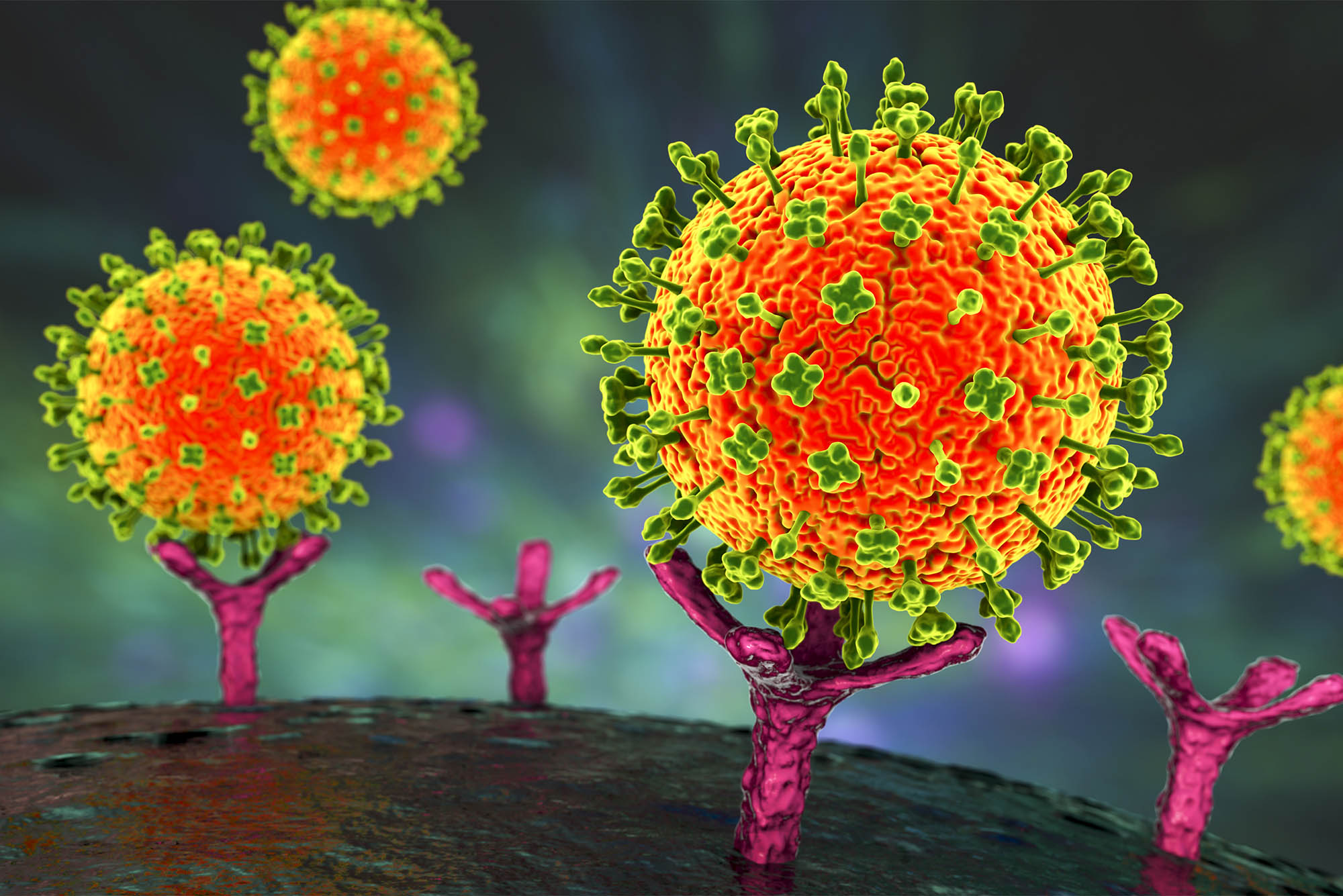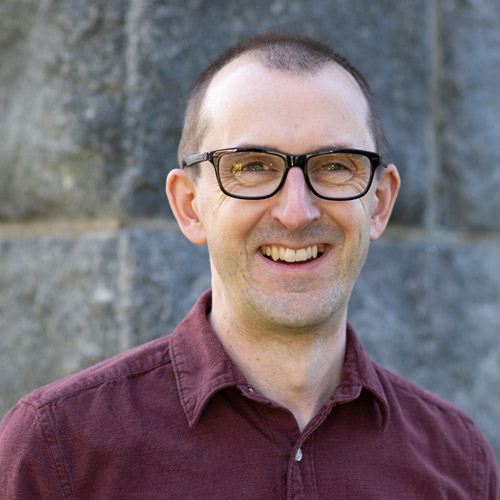BU Researchers Join $100 Million Effort to Fight Future Deadly Pathogens

Nipah is on the World Health Organization’s priority list of pathogens and diseases for research. As part of the Howard Hughes Medical Institute’s Emerging Pathogens Initiative, scientists at BU will help look for ways to contain or defeat the virus and other threats. Artist’s rendering via iStock/Dr_Microbe
BU Researchers Join $100 Million Effort to Fight Future Deadly Pathogens
Scientists from NEIDL and medical and dental schools part of Howard Hughes Medical Institute push to get ahead of pandemics like COVID-19
The next pandemic could already be lurking somewhere, and scientists want to make sure the world is ready when it springs. As we slowly exit the current COVID-19 pandemic, Boston University researchers are joining a $100 million effort to advance our understanding of dangerous pathogens—and help spur new ways to defeat or at least contain them. The Howard Hughes Medical Institute’s (HHMI) Emerging Pathogens Initiative, which is pulling in 70 scientists from 29 organizations, will include 7 BU researchers, who will be part of teams working on the next generation of RNA-based antiviral therapies and investigating microscopic pathogenic parasites called protozoa. BU’s share of the funding will be $16 million.
“We are optimistic that this initiative will help these scientists develop new, untested approaches that can reveal how pathogens work and how the human immune system responds to pathogen infection,” says Leslie Vosshall, the institute’s vice president and chief scientific officer. “With this program, we hope to gain some of the knowledge and tools we need to get a scientific head start on future epidemics.”
COVID-19 has shown how important that push will be. According to the World Health Organization, the pandemic has caused close to seven million deaths globally, while the International Monetary Fund has forecast the cost to the worldwide economy will exceed $12.5 trillion.

Among those contributing to the HHMI initiative is BU National Emerging Infectious Diseases Laboratories (NEIDL) researcher Elke Mühlberger, an expert on highly pathogenic viruses like Ebola and Marburg. Her lab began studying SARS-CoV-2 back in March 2020 and recently started investigating other viruses of concern, including Nipah. Mühlberger is teaming up with BU scientists Daniel Cifuentes, Anthony Griffiths, and Gustavo Mostoslavsky to focus on “merging the technologies of RNA biology and enhanced biosafety to create next generation broad spectrum RNA-based antiviral therapies,” according to HHMI’s announcement of the initiative. RNA, ribonucleic acid, helps our bodies make proteins, translating the messages encoded in our DNA. But RNA also fuels the viruses that cause Ebola, measles, polio, influenza, rabies, hepatitis C, even the common cold.
“The goal is to come up with mechanisms and strategies, to use the knowledge that we gain through this project to block these viruses, to find antiviral countermeasures,” says Mühlberger, a BU Chobanian & Avedisian School of Medicine professor of microbiology and NEIDL director of integrated science services. “Almost all emerging viruses are RNA viruses, so these viruses are a real threat to public health, and we have to understand them better to come up with therapeutic interventions.”
The team will be led by HHMI investigator Anna Marie Pyle, a world leader in the study of RNA structures and mechanisms. She says the group is hoping to break with historical approaches to developing antivirals—in the past, scientists have had to pioneer new drugs to take on every new virus, often long after it’s begun wreaking its havoc.
“The kinds of therapeutics we’re trying to develop through the collaboration are pan-virals—they work in different kinds of virus families, across different groups of viruses,” says Pyle, Yale University’s Sterling Professor of Molecular, Cellular, and Developmental Biology. “We’re going to be testing those in cells, organoids, and animals, so that we have tools that can be used as soon as there’s an outbreak—we don’t have to wait for years of study before we have a way to provide protection. These are tools that strengthen the human innate immune system, enabling it to combat diverse viruses.”

“The pandemic made it so clear how basic research is key to potentially quickly addressing a major problem,” adds stem cell expert Mostoslavsky, a BU Chobanian & Avedisian School of Medicine professor of medicine and microbiology and codirector of the Center for Regenerative Medicine. “We did a spectacular job addressing this pandemic, but it could have been better; therapeutics was one of the things that was lagging behind.”
Mühlberger says each scientist on the team brings a slightly different area of expertise to the work, from RNA mechanisms to animal and human models to the viruses themselves. And with the NEIDL, a secure space for studying a range of infectious diseases and pathogens in a protected environment, BU has the infrastructure and experience necessary to host these cutting-edge studies.
“This grant is a perfect example of how researchers with complementary expertise work together in an attempt to solve urgent global problems,” she says.
The other Emerging Pathogens Initiative team featuring BU researchers includes Ruslan Afasizhev, Inna Afasizheva, and John Samuelson, all BU Henry M. Goldman School of Dental Medicine molecular and cell biology faculty members. They’ll be working with scientists from the Broad Institute, Harvard T. H. Chan School of Public Health, and Massachusetts General Hospital to decode “the mitochondrial proteomes of six pathogenic protozoa.”
“Being one of the 70 researchers selected for HHMI funding means being at the top of one’s area of research. The goal is to leverage BU’s expertise in human parasite molecular biology and genetics,” says Afasizhev, who adds that the work could lay the foundation for developing a new generation of drugs targeting historically neglected diseases. “We aim to build highly accurate and comprehensive mitochondrial proteomes of parasites that cause human diseases in some of the most disadvantaged countries in the world.”
The multidisciplinary and cross-institutional nature of the projects fits with one of the founding goals of the Emerging Pathogens Initiative: to foster more collaborative efforts like those that have advanced our understanding of COVID-19 and led to vaccines against it.
“Studies of infectious disease, and certainly viruses, have become incredibly complex, especially if you are trying to get to the point where you can translate it into something therapeutically useful,” says Pyle. “No one lab, even no one university, can cover everything that’s needed to get the job done in developing new approaches to combat the next pandemic.”
The HHMI’s inclusion of BU researchers also marks another milestone for the NEIDL, according to David Gillerman, senior director of foundation relations for the BU Medical Campus.
“Rarely, until now, have private philanthropic organizations supported the work of the NEIDL research faculty,” Gillerman says, referencing both the HHMI backing and recent awards from the Bill & Melinda Gates Foundation. “These new foundation grants, while illustrating the impact of the pandemic on the grant-making agendas of these funders, also reflect their recognition that NEIDL has a critical role to play in global pandemic response.”

Comments & Discussion
Boston University moderates comments to facilitate an informed, substantive, civil conversation. Abusive, profane, self-promotional, misleading, incoherent or off-topic comments will be rejected. Moderators are staffed during regular business hours (EST) and can only accept comments written in English. Statistics or facts must include a citation or a link to the citation.